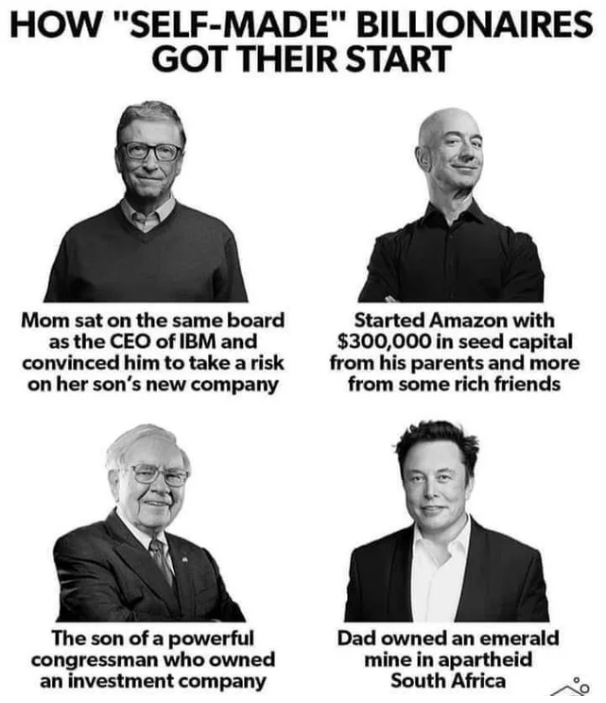Hereditary Oligarchy Fashion Retail
The three most competent leaders just happened to be born to the family that founded the company 100 years ago? Sure.
We hear a lot of talk about merit. We’re meant to believe we live in a meritocracy where everyone earns what they produce. If I’m having problems with leadership, it’s my problem, not theirs. After all, they have the ‘merit’ to be in charge, and I do not.
If I were more worthy, maybe they’d listen to me. Maybe they wouldn’t hire incompetent psychopathic executives to wield capricious power against me and those around me.
The retail technology organization I write about has not had a weak reputation as a technology employer for a long time. There were two entries on Glassdoor. One for the retail enterprise that was reasonably highly rated, and the technology organization that was rated something abysmally low, like 1.5/5 or something.
At a leadership offsite, our SVP of digital enterprise (someone who gets a fair bit of attention in my hereditary oligarchy fashion retail stories) stood up in front of the entire leadership team, several hundred leaders strong, and made the following statement.
”We could integrate the two Glassdoor entries so there’s only one, and that’d drive up our average score, but we’re committed to doing it right, to solving the problems.”
Two months later, there was only one entry on Glassdoor and a decent 3.8 average next to it.
The fact of the matter is we’ve been sold a bill of goods on this meritocracy lie. In the retail enterprise, certainly this one, there’s a severe problem of oligarchs who inherited their positions making technology decisions without expertise. This goes all the way up to the board members they select because the selections are typically focused on retail domain expertise. Our current system chooses people who were carried to executive positions in other retail enterprises.
Consequently, the grandchildren of the founder who hypothetically run the company, for some reason, end up victims of charlatans and psychopaths with extensive experience damaging technology enterprises. Those executives get a big bump by offering to “slum it” in the shoe-selling trade because the need for technology transformation is so great.
All these men think they’re there to save a sinking ship, and everyone there should be so grateful to have been condescended to by these kings of technology who would otherwise be inventing Xhitter, or iPhones, or whatever. The changes needed at any given organization of size take five years or more to implement and produce returns. Yet, the average tenure for a C-level executive in tech is years shy of that number.
This hereditary oligarchy fashion retail enterprise has been through wave after wave of disastrous executive teams.
The cycle goes something like this…
Hire a new executive from a big-name tech enterprise. Often, a lower level at that tech enterprise than they’ll occupy in the retail enterprise, so it’s a lovely title bump for him (yes, it’s almost always a ‘him’), and then he can push out all the previous MaGoo’s croneybros and replace them with his croneybros from previous disasters.
The new executives promise to fix ALLTHETHINGS and make that the basis of their abusive policies and approaches.
”It’s going to be tough everyone, we’re not messing around anymore, the previous lazy losers are gone and I’m putting the hammer down with my favorite croneybros!”
The croneybros displace people with domain expertise, tenure, and political awareness to inject the most of their favorite golfing or crypto buddies. After around 2 or 3 years they quietly slip heroically off into the sunset usually to “go spend time with their family” and always without having accomplished anything coherent or beneficial to employees, customers, shareholders, or anyone else.
The search begins anew and some arrogant psychopathic douchebro from another enterprise shows up and repeats the process.
Ultimately, this cycle of ludicrous waste repeats itself ad nauseam and might be why these positions select avaricious, mean-spirited narcissists who make their employees’ lives hellish.
The retail tech enterprise is currently operating as close to how a steel mill in the 1900s did within the boundaries of what little labor protection laws haven’t been intentionally eroded by those same oligarchs’ political influence.
Ultimately, even when a new CTO is openly abusive and disastrous, nothing can be done to remove them in the short term because there are golden parachutes in the contract, and the stock price doesn’t love it when a retailer has 3 CTOs in 3 years.
So the employees suffer, and countless billions are wasted creating massive organizations primarily staffed by people whose job it is to try and subvert executive psychopathy to get anything delivered at all.
This short-term focus and absence of authentic leadership or spine within the top-level executive systems cause much suffering and waste. Being a rational actor who’s trying to improve things or get things done is highly toxic to executive narcissists because questions emerge as to why decisions that are so harmful and costly are constantly being made. Why are you hiring a dozen of your friends into their first-ever VP position over a domain in which they have no domain expertise and bring nothing, other than being obsequious to you, to the role?
I remember asking a senior executive at an innovative organization that was doubling in size annually, “So there’s a ‘vice president of strategic growth’ and so much chaos from hiring so aggressively. I see growth, but what’s the strategic part? How is this growth strategic? What defined top-level corporate product strategies are guiding this hiring bonanza? “
The answer was simple: “Well, we want to build more stuff than we build every year, so we need more people to build more stuff.”
As a consultant trying to consult, I make the mistake of asking the obvious follow-up question “Okay, so you’ve doubled engineering staff annually for the last three years running. Are you delivering more than you were before? Has there been a measurable, proportional increase in profits, and subscriptions, to justify the massive increase in operational overhead?”
Often, the answers are empty variations of “It’s complicated,” but why is employee productivity “uncomplicated” and in need of micromanaging but if one sociopath with a good Story wants to spend hundreds of millions hiring people for no good reason, that’s fine? ‘You wouldn’t understand’ well I’ve always said “Try me” and, to date, nobody has. Maybe my tiny high-school dropout pea brain can’t comprehend it.
These wasteful abuses will continue until we get labor unions back into the mix and curtail the political power of capital. The Expedia executive takeover that shat the bed after the Amazon executives shat the bed after the Microsoft executives shat the bed will keep rinsing and repeating as long as people keep buying shoes.
What can we do?
1. Support labor unions in the front line and in the office where white-collar crime is rampant and abuses labor.
2. Elect people who will regulate these industries and their labor practices. “At-will” employment and "Right to work” must be abolished. At least make these assholes fabricate some lies to fire someone, and if those lies can be proven false, hold them accountable instead of allowing them to strip income and health care from people for doing their best.
3. Elect people who will create and support social safety nets, without which all labor is forced. If my family dies or loses their health insurance as a result of me not serving capital, I am not working voluntarily. I MUST work to afford basic human needs. With this leverage, executives can do nearly anything they want to employees.
Otherwise, we’ll have eight-year-olds working in coal mines again any day now.
Some kids are born Swedish-American fashion retail oligarchs; some kids are born coal miners.
Let’s finally level the playing field.






